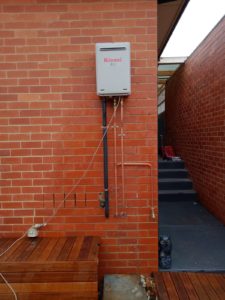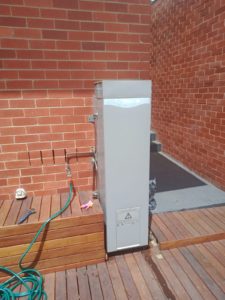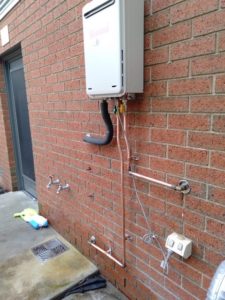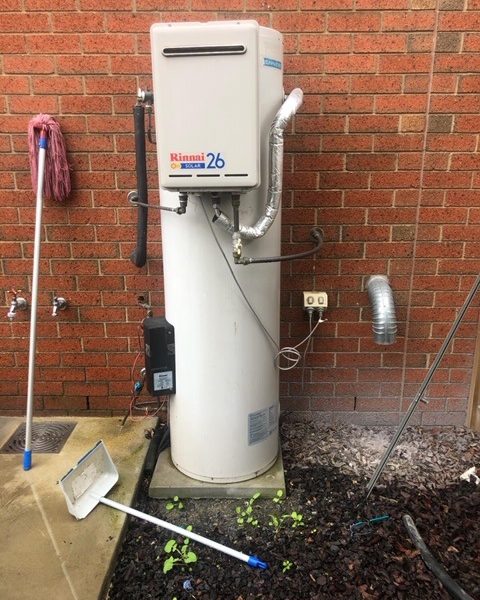 The Installation of a hot water system to your home (gas or electrical) needs to be designed to produce a constant and reliable supply of hot water to all outlets. There are many details that need to be considered during the design phase and your local licensed Master Plumber should be able to advice you on the best hot water system to suit your needs.
The Installation of a hot water system to your home (gas or electrical) needs to be designed to produce a constant and reliable supply of hot water to all outlets. There are many details that need to be considered during the design phase and your local licensed Master Plumber should be able to advice you on the best hot water system to suit your needs.
We’ve put together 5 important steps you need to take before choosing and installing your home hot water system. By following these 5 steps, you’ll not only prevent some of the common mistakes we see people make, but you’ll save yourself time and money.
Step 1: Correctly Size Your Hot Water System
We often come across homeowners who have bought a new hot water system on sale at Bunnings or on EBay at a nicely discounted price only to find out it isn’t the right size; requires a fuel source they don’t have or is the wrong model for their needs.

A correctly sized hot water system installation will save you money on running costs, last longer due to operating more efficiently and prevent the frustration of running out of hot water with a head full of shampoo.
The best way to size your hot water system is to have your local licensed plumber size it for you. At Essendon Plumbing Services if you wish to purchase your own hot water service, we are happy to size it for you so there are NO surprises when we come to install it.
Step 2: Choose the Best Type of Hot Water System for Your Needs & Budget
There are 2 common types of hot water systems in Melbourne (storage and continuous flow) and they are built to be installed in 2 different locations (inside and outside). These come in 4 common fuel types (natural gas, electric, solar and heat pump) and there are pros and cons specific to each installation.
 Conditions that determine the best type of hot water system will be availability of fuel source (gas, electricity or sun), locations & space available, maximum load in which the system will be under during peak demand, and the cost of both the unit and the installation.
Conditions that determine the best type of hot water system will be availability of fuel source (gas, electricity or sun), locations & space available, maximum load in which the system will be under during peak demand, and the cost of both the unit and the installation.
Essendon Plumbing Services will provide you with a free quotation and advice on the type of hot water system that best suits your needs and budget.
Step 3: Hot Water Must Be Tempered to Bathrooms
The hot water supply to all bathroom outlets in your home needs to be tempered to 50°C to prevent scalding. This is achieved through a device called a ‘Tempering valve’ and can be installed near your bathrooms. In simple terms it mixes hot and cold water together to adjust the temperature to 50°C before it reaches your taps, which your licenced plumber will test and set.
It is common in the case of a replacement hot water service, where existing pipework is not accessible to locate the tempering valve at the hot water system itself. The disadvantage of this type of installation is your laundry and kitchen taps will also be tempered to 50°C which can cause an issue when cleaning fats from dishes or if you require hotter water for your laundry appliances.
Step 4: Hot Water Must Be Stored at No Less than 60°C
To protect against the growth of Legionella bacteria, it is a legal requirement that any stored heated water be kept at a minimum temperature of 60°C. By adjusting the temperature on the thermostat to your storage hot water system to below 60°C, you may be unknowingly exposing yourself and your family to Legionella Bacteria.
By maintaining the water temperature in your hot water storage tank above 60°C will kill the potential of bacteria growing in your hot water system. When a licensed plumber installs your new storage hot water system, they will check the temperature of the water out of the tank to make sure it complies to regulations and your hot water system is safe.
Step 5: So, Can I DIY install a Hot Water System?
While tempting it is to watch a YouTube video or read a blog on how to install your own hot water system, our advice is the dangers far outweigh the benefits, don’t risk it. Hot water systems have a fuel source and operate under high pressure, meaning they can be extremely dangerous to work on. The fuel source will be either electricity or gas and both can potentially cause serious damage or death if handled incorrectly.
In Australia you must engage a licensed plumber to install all types of hot water systems. A licensed plumber needs to provide you with a certificate of compliance on completion of the installation. This gives you peace of mind of a 7-year plumbing industry guarantee against all workmanship.
Need Help With Installing Your New Hot Water System?
Essendon Plumbing Services’ specialise in all makes and models of hot water system replacement and repairs for your Melbourne home. Our 24/7 Emergency Service is fast and reliable, and we offer a 100% Customer Satisfaction Guarantee. If you’re not happy we’ll fix it for free.
So, give us a call on 1300 193 298 or book online, we’d be happy to help!


 Case Study – Hot Water Issues in Diamond Creek
Case Study – Hot Water Issues in Diamond Creek

